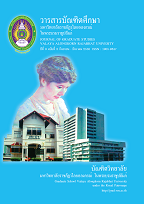การบริหารจัดการผลการปฏิบัติงานเทศบาลในจังหวัดสมุทรปราการ THE PERFORMANCE MANAGEMENT OF MUNICIPALITIES IN SAMUT PRAKAN PROVINCE
Main Article Content
Abstract
บทคัดย่อ
การศึกษาครั้งนี้มีวัตถุประสงค์เพื่อ 1) ศึกษาการจัดการผลการปฏิบัติงานตามภารกิจความรับผิดชอบตามพระราชบัญญัติเทศบาลในจังหวัดสมุทรปราการ 2) ศึกษาปัจจัยที่มีผลต่อการจัดการผลการปฏิบัติงานเทศบาลในจังหวัดสมุทรปราการ 3) เสนอแนะแนวทางการจัดการผลการปฏิบัติงานที่เหมาะสมของเทศบาลในจังหวัดสมุทรปราการ การวิจัยนี้เป็นแบบผสานวิธีทั้งเชิงปริมาณ และเชิงคุณภาพ การวิจัยเชิงปริมาณ ดำเนินการโดยใช้กลุ่มตัวอย่างรวม 384 คน ตามสูตรของทาโร ยามาเน ประกอบด้วยประชาชนผู้มีส่วนได้ส่วนเสีย ได้แก่ สมาชิกสภาเทศบาล กำนัน ผู้ใหญ่บ้าน ผู้นำชุมชน และอาสาสมัครสาธารณสุข จำนวน 193 คน และพนักงานเทศบาล จำนวน 191 คน ในจังหวัดสมุทรปราการ 18 แห่ง จากประชากร รวม 9,323 คน โดยใช้วิธีสุ่มตัวอย่างแบบแบ่งชั้นภูมิและแบบอย่างง่าย เครื่องมือที่ใช้ในการวิจัยเป็นแบบสอบถามมาตราส่วนประมาณค่า
5 ระดับ มีค่าความเชื่อมั่นทั้งฉบับเท่ากับ 0.89 สถิติที่ใช้ในการวิเคราะห์ข้อมูล ได้แก่ ค่าร้อยละ ค่าเฉลี่ย ค่าส่วนเบี่ยงเบนมาตรฐาน สถิติที่ใช้ทดสอบสมมติฐาน ได้แก่ การวิเคราะห์ความถดถอยขั้นตอน ส่วนการวิจัยเชิงคุณภาพ ดำเนินการโดยการสัมภาษณ์เชิงลึกผู้ให้ข้อมูลสำคัญ 27 คน ประกอบด้วย คณะทำงานตรวจประเมินมาตรฐานการปฏิบัติราชการขององค์กรปกครองส่วนท้องถิ่น 14 คน และคณะควบคุมการบริหารงานของเทศบาลในจังหวัดสมุทรปราการ 13 คน โดยการเลือกแบบเจาะจง และวิเคราะห์ข้อมูลโดยการวิเคราะห์เนื้อหาและการตีความ
ผลการวิจัยพบว่า
1) การจัดการผลการปฏิบัติงานเทศบาลในจังหวัดสมุทรปราการ จากการวิจัยเชิงปริมาณพบว่าโดยรวมมีการปฏิบัติอยู่ในระดับมาก (= 3.63, S.D. = 0.82) เมื่อพิจารณาเป็นรายด้านพบว่า ด้านงานป้องกันและบรรเทาสาธารณภัยอยู่ในระดับสูงสุด (
= 3.84, S.D. = 0.80) รองลงมาคือด้านสวัสดิการสังคม (
= 3.75, S.D. = 0.77) ด้านงานทะเบียนราษฎร (
= 3.74, S.D. = 0.78) ด้านโครงสร้างพื้นฐาน (
= 3.68, S.D. = 0.76) ด้านการศึกษาขนบธรรมเนียมประเพณี และวัฒนธรรม (
= 3.63, S.D. = 0.79) ด้านการคลัง (
= 3.52, S.D. = 0.82) ทั้งหมดอยู่ในระดับมาก และมีเพียงด้านเดียวอยู่ในระดับปานกลาง คือ ด้านสาธารณสุขและสิ่งแวดล้อม (
= 3.24, S.D. = 1.04)
2) ปัจจัยที่มีผลต่อการจัดการผลการปฏิบัติงานเทศบาลในจังหวัดสมุทรปราการ จากการวิจัยเชิงปริมาณ พบว่า โดยรวมมีการปฏิบัติอยู่ในระดับมาก (= 3.59, S.D. = 0.82) โดยมี 4 ปัจจัยเรียงลำดับตามค่าสัมประสิทธิ์ถดถอยบางส่วน ดังนี้ ปัจจัยทรัพยากรการบริหาร ปัจจัยพระราชบัญญัติเทศบาล ปัจจัยการมีส่วนร่วมจากทุกภาคส่วน และปัจจัยภาวะผู้นำทางการเมือง ซึ่งสามารถอธิบายความผันแปรของการจัดการผลการปฏิบัติงานเทศบาลในจังหวัดสมุทรปราการได้ ร้อยละ 74.40 (R2 = .744) ที่ระดับนัยสำคัญทางสถิติ 0.01
3) ข้อเสนอแนวทางการจัดการผลการปฏิบัติงานที่เหมาะสมของเทศบาลในจังหวัดสมุทรปราการซึ่งได้จากการสังเคราะห์ข้อมูลการวิจัยเชิงปริมาณและเชิงคุณภาพ ประกอบด้วย (1) เทศบาลต้องให้ความสำคัญมากที่สุดต่อพันธกิจด้านสาธารณสุขและสิ่งแวดล้อมของจังหวัดสมุทรปราการโดยร่วมกับภาคส่วนอื่นๆ และมุ่งสู่การเป็นเมืองสีเขียว (Green City) ลดความรุนแรงจากมลพิษ เพื่อประชาชนอยู่ได้ อุตสาหกรรมอยู่รอด (2) กระบวนการจัดการของเทศบาล ต้องมุ่งเน้นปัจจัยมีผลต่อการจัดการผลการปฏิบัติงานเทศบาลโดยตรง ประกอบด้วยปัจจัยทรัพยากรการบริหาร ปัจจัยพระราชบัญญัติเทศบาล ปัจจัยการมีส่วนร่วมจากทุกภาคส่วน และปัจจัยภาวะผู้นำทางการเมือง (3) สร้างกลยุทธ์พัฒนาเครือข่ายเทศบาลด้วยกันโดยการแบ่งปันข้อมูล ร่วมกันพัฒนา พันธกิจที่เป็นปัญหาร่วมกัน (4) เทศบาลควรมีการประสานความร่วมมือทั้งภาครัฐและเอกชนโดยการบูรณาการร่วมกันระหว่างนิคมอุตสาหกรรม เทศบาล และกับภาคประชาสังคม โดยเฉพาะผู้นำชุมชน (5) เทศบาลควรบริหารจัดการภายใต้หลักธรรมาภิบาล เน้นความโปร่งใส ตรวจสอบได้ มีมาตรการเชิงรุกในการป้องกันและปราบปรามการทุจริต และ 6) เทศบาลควรเน้นการให้บริการเชิงรุก รวดเร็ว เท่าเทียมกัน และประชาสัมพันธ์ข้อมูลข่าวสารการดำเนินการอย่างหลากหลาย เป็นแบบวัฒนธรรมตอบสนองผู้ใช้บริการ
ABSTRACT
The objectives of this research were to 1) study the performance management of municipalities in Samut Prakan province, 2) study factors affecting the performance management of municipalities in Samut Prakan province and 3) propose the guidelines for the performance management of municipalities in Samut Prakan province. This research was a mixed methods research which combined both quantitative and qualitative approaches. The quantitative research was conducted by gathering data from 384 respondents and the sample size was obtained by the calculation with Taro Yamane’s formula, from the population of 9,323 persons. The samples comprised 193 people who were the stakeholders in their municipalities namely the member of municipalities’ council, sub-district headmen, village headmen and village public health volunteers and 191 municipalities’ personnel in Samut Prakan province. The samples were selected by stratified random sampling and simple random sampling. The tool for data gathering was a 5-level rating scale questionnaire with a reliability at 0.89. The data were analyzed by the statistics composed of percentage, mean, standard deviation and stepwise regression analysis. The qualitative research was conducted by in-depth interviewed of 27 key informants consisted of 14 taskforces of standard inspection and evaluation for local government and 13 taskforces of controlling of municipalities in Samut Prakan province who were selected purposively. The data were analyzed by content analysis and interpretation.
The research findings were as follows:
1. The management performance of municipalities in Samut Prakan province from the quantitative research found that the overall was at a high level
( = 3.63, S.D. = 0.82), while considered in each aspect found that the highest mean was the aspect of disaster prevention and mitigation (
= 3.84, S.D. = 0.80), followed by the aspect of social welfare (
= 3.75, S.D. = 0.77), the aspect of civil registration
(= 3.74, S.D. = 0.78), the aspect of infrastructure (
= 3.68, S.D. = 0.76), the aspect of education, customs and culture (
= 3.63, S.D. = 0.79), the aspect of finance (
= 3.52, S.D. = 0.82) all of these aspects were at a high level, but the aspect of public health and environment (
= 3.24, S.D. = 1.04) was at a moderate level.
2. The factors affecting the management performance of municipalities in Samut Prakan province which found from the quantitative research the overall of practices were at a high level (= 3.59, S.D. = 0.82). The four factors ranked from the partial regression coefficient as the administration resources factor, followed by the municipality act factor, the participation factor and the political leadership factor. These 4 factors could explain the variation of the management performance of municipalities in Samut Prakan province as 74.40 percent (R² = 0.744) at the statistical significant level of 0.01.
Article Details

This work is licensed under a Creative Commons Attribution-NonCommercial-NoDerivatives 4.0 International License.
บทความทุกเรื่องได้รับการตรวจความถูกต้องทางวิชาการโดยผู้ทรงคุณวุฒิ ทรรศนะและข้อคิดเห็นในบทความ Journal of Global of Perspectives in Humanities and Social Sciences (J-GPHSS) มิใช่เป็นทรรศนะและความคิดของผู้จัดทำจึงมิใช่ความรับผิดชอบของบัณฑิตวิทยาลัย มหาวิทยาลัยราชภัฏวไลยอลงกรณ์ ในพระบรมราชูปถัมภ์ กองบรรณาธิการไม่สงวนสิทธิ์การคัดลอก แต่ให้อ้างอิงแหล่งที่มา


